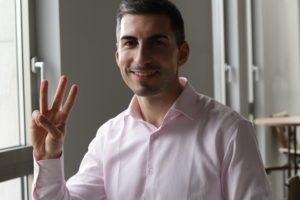Mr. Deputy Mayor, How Many Startups Has Sofia Municipality Worked With?
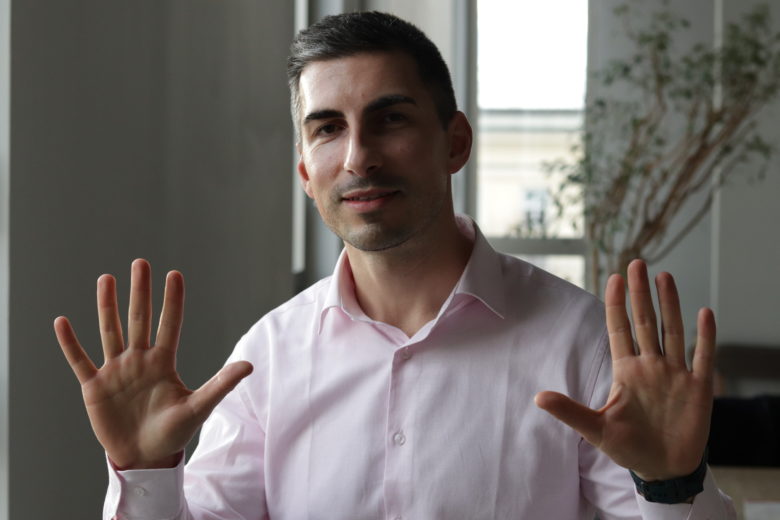
Тhe municipality of the Bulgarian capital city Sofia features a new department dedicated to innovation and digital transformation, and it’s led by the newly appointed deputy mayor Vladimir Danailov.
Danailov holds an MBA from the American University in Bulgaria, a Master’s Degree in HR Management from the Technical University in Sofia, Bulgaria, and a Bachelor’s Degree in Industrial Management from the same university. Danailov’s professional experience has been in the Real Estate, Manufacturing and Trading sectors, where he held the positions of Head of Sales and Country Manager in several companies with an international presence. According to his Crunchbase profile (yes, interestingly enough we found one), Danailov has a strong background in entrepreneurship and business development and a deep interest in start-ups.
Up until the end of last year, Danailov was CEO of the municipal agency Sofia Invest, which is responsible for promoting the city as an investment destination. In 2019, Sofia Invest, released a new strategy for the digital transformation of the capital city, which has a strong focus on strengthening the relationship between the public administration and the startup and innovation ecosystem. So, we decided to have a conversation with Vladimir Danailov about the strategy, the planned implementation steps, and the overall plan for the digital development of the city.
Trending Topics: What is the role of the Deputy Mayor in the Digitalization and Innovation department?
Vladimir Danailov: My role as the Deputy Mayor for Digitalization, Innovation and Economic Development, and the role of the team, is to be the leader and engine of the digital transformation of Sofia. Our mission is to improve the quality of life in the city. This is directly related to improving the business climate in Sofia, the ability and the capacity of the city to attract investment, human capital, and innovation. Our goal is to improve the well-being of the citizens by digitizing and improving the overall administrative service in the city, to stimulate the innovation potential and the technology companies in Sofia, to work to attract investments, and of course, to promote Sofia and the business ecosystem of the city.
What are your goals?
Our goals are ambitious (smiles). We believe Sofia has the capacity to be one of Europe’s technological leaders, and now is the right moment to start thinking in this direction, because there is momentum and the prerequisites for such technological growth are there. We can be a technology leader in Europe. This has to be a big part of the way we think and the story we tell about ourselves to the rest of the world. We aspire Sofia to be a technologically advanced city with an excellent business environment and quality of life. We want the city to be globally recognized as a testing ground, as a place where smart city solutions are created, a place where products and services with global applications are being developed.
How could that happen in practice?
By creating processes, platforms, and an organization so that the city is always ready to meet the challenges of the future. Recently, someone asked me what the ultimate goal of the digital transformation strategy is. There is no ultimate goal, it is an endless journey. We need to have homogeneous goals and a joint approach, as a municipal administration, as a business, and as a society together. We should be adaptable, resilient, open and future- proof.
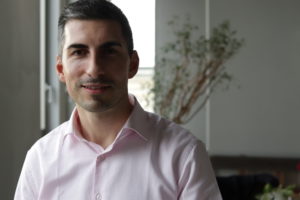
I understand. Still, if you don’t have any clear milestones and smaller goals, it can become quite a tedious process without measurable progress. What are your metrics?
Of course, we started with priority projects. For this year we have set specific goals. One is to reduce the administrative burden for citizens and businesses, one of the biggest challenges in the city currently. At this moment, Sofia Municipality provides around 50 e-services. Our plan is to expand this portfolio to over 170 services in the next couple of years. This way, we will directly minimize the time our citizens would otherwise waste at the counters. The citizens should be able to interact with the city over their smartphones, as we now do with online banking, for example. Another area is open data. It is not a specifically Bulgarian challenge – for example, Europe is also not homogeneously developed when it comes to city data governance.
In the next couple of months, we will showcase the whole open data value chain – from data generation, to dynamical real-time sharing of data, and make it accessible for the businesses so they can invent and create solutions that will benefit the citizens. Over the next years, we will incrementally open more and more data sets so that more products are developed using those data sets. We have the good example of Vilnius, a city that became a leader in the number of green technology companies after opening up data sets related to ecology and urban environment, and thus enabling the local innovation ecosystem to develop solutions. We will do the same very soon. This year, we want to open a few data sets and invite local startup and technology companies for use-cases. These are some of the specific goals and we are already forming collaborations with companies in the above areas. Another focus is the implementation of smart urban solutions. We want to see more pilot projects in the city. The more pilots we make, the more innovative ideas we will scale, and that is how Sofia will become a truly intelligent city.
So far, how many pilots are there and in what areas?
There are number of pilots in many different fields. For example, in the fields of public transportation, more convenient payment methods, applications that show routes and keep track of when the next public transit vehicle arrives, as well as the optimisation of the efficiency and quality of the administrative service.
Speaking of which, there has recently been one case where a developer of such an application requested public transport data in the city to optimize its product for the citizens and tourists in Sofia, and the Urban Mobility Center proudly rejected the request.
One of the key priorities for Sofia is the development of a data policy. The main question is who owns the data – the city or the citizens. In Estonia, for example, it was decided that the data belongs to citizens, in other countries the city is the owner of the data. This debate is forthcoming in Sofia. It takes about two years on average to create such a policy, judging by the experience of other European cities. We are starting this initiative now.
This will regulate the processes of data sharing, data usage, and how the Urban Mobility Center can provide access to the data. Without such a policy, the UMC will always wonder whether to share the data.
All of this is great, but there are too many topics. What is your first project at the new position?
The e-services. We are upgrading and expanding the current system which was created 5-7 years ago. The goal is to shortly launch another 15-30 new e-services, which are not digitally accessible at the moment. For example, people with disabilities will be able to apply for parking permits online.
Last year, you published a strategy for the digital transformation of the city. What role does this strategy play – a recommendation or working document?
Firstly, I would like to tell a bit more about the drafting of this strategy. Back in 2018, the City of Sofia was selected to take part in an EC project. The project was called ‘Digital Cities Challenge’ and provided consultancy, methodology and mentorship support from the EC and advanced cities such as Amsterdam, Barcelona, Hamburg, Nice, Lisbon to create this strategy. We engaged a wide network of local stakeholders – small and large technology companies, NGOs, educational organizations, politicians, representatives of the public administration, etc. We started with an assessment of the digital maturity of Sofia. In some aspects we are quite digitally mature, in others, we have a long way to go. After the assessment, in a number of working groups, we set our vision, mission and ambitious goals for Sofia’s future development. The EC’s goal is to support the participating cities, by providing resources and mentoring. The cities, in turn, have the task to identify their vision and strategy and to create a pipeline of digital projects to tackle urban challenges. We have outlined 14 such projects. The strategy has the role of defining the vision of what a city Sofia should be and the road to get there.
These 14 projects you are talking about also have a timeline. Realistically, which one will start this year?
This year’s agenda is open data projects – creating rules and policies, and developing a platform that can connect data generators to their users in real-time. Electronic services and cyber security are on the agenda as well. We have also started work on a small project on reducing the number of certificates necessary for the enrollment of children in kindergartens via interconnecting registers.
There is also one project related to shared rides in neighborhoods. What is it and what is the role of the municipality in such endeavors?
Yes, this is a nonprofit rideshare. If there is a way to get people to combine and travel together even to get to a certain metro station, it would also reduce traffic and emissions. The municipality can be the leader and the engine of such a platform, and why not even generate it. We have always imagined that we will make such decisions in collaboration with the businesses that operate in the city. As a city, we are happy to have such a well-developed technology sector and we want to be its customer and to use the solutions it develops.
How will this work in practice? Say I’ve developed such a solution and I’m looking for a client or a partner to do a pilot with, and I come to the municipality. What happens next?
Most likely you will come to us. We will look at your solutions, we will organize the municipal enterprise or division to professionally partner with you, and we will put together a team to work with you, do monitoring, develop proof of concept, measure how pragmatic the solution is and come up with a scaling idea if it proves to be useful enough for the city.
Are there any procedures for such cases?
I have met hundreds of startups through my previous position at the Sofia Investment Agency and have often been asked this exact same question. We are in the process of developing a culture of cooperation between the city administration and the business. With every next project of this kind, we want to create habits of collaboration, as well as communicate that prototyping, testing and inventing is the way to progress. In other words, it is our responsibility to assist the development and creation of the necessary procedures.
Recently the budget of the Sofia municipality was voted, and there was not a word about innovation and digitization. Do you have the budget to implement all these ideas?
The budget for digital initiatives approved by the Sofia City Council is BGN 4.7 million. We will not rely solely on the budget of the city, and will apply for the many available European programmes aimed at digitizing cities. Normally, in Europe, the budget for digital initiatives and innovation is between 1-3% of the city budget (in the case of Sofia that should have been at least BGN 17 million – ed.n.).
How can citizens actually be involved in giving a direction for innovation in the city?
Improving the dialogue with citizens through digital channels is also a priority. Even now this is possible through the city portal. But soon we are launching more platforms, user-friendly and designed in a way that allows every citizen to express their opinion.
Who is developing the platform?
We are still on an idea stage on this. We will share more information soon.
The digital strategy also addresses the problem of vendor lock-in. What do you mean and how it is translated to the software systems of the municipality?
Vendor lock-in will prevent more companies from getting involved in the technology development and advancement of the city. We need to avoid it.
Currently, how many of the municipal systems are locked in for new solution providers?
We are currently working on an evaluation. Sofia Municipality is a huge conglomerate of 53 companies and 15 municipal enterprises, and it is a time-consuming project.
Is it difficult to bring across new ideas in the municipality?
Like in every large organization, yes. It’s the same in the corporate world. I think there is already an understanding and a will to give new ideas a chance. One such proof is the establishment of a new vertical, a new type of local government structure, responsible for digital transformation, innovation and economic development with a team of 40 people. Until now, there was a team that took care of the technological infrastructure of the municipality, and from now on, our focus will be on the services for citizens and businesses with a customer-centric approach.
It was recently announced that Sofia is participating in the EC project on using European cloud infrastructure for policy decision making? What does this actually mean?
This is a project we are involved in as a use-case. The idea is to share data needed for policy making. We are curious about the outcome of this project ourselves. We will share data and choose the challenge we want to solve.
In what directions do you think?
Transport and ecology.
How do you look at policies at national level that hamper the collaborative economy – such as the latest Airbnb case?
It is crucial to examine the challenges that cities like Barcelona and Berlin had to face. There, such platforms made the central parts of the cities often “colonized” by tourists, the central areas stopped being affordable for the average locals to live. It is not of interest for the citizens of Sofia if the downtown of Sofia becomes terribly expensive to live and to reside, forcing them to live on the outskirts of the city.
On the other hand, we, as a city, should recognize the benefits from such platforms. By cleverly using the platforms, we can gentrify areas of Sofia that we want to develop. Also, with the right rules, such platforms would translate into an economic opportunity for the city. My personal opinion is that we should include the citizens in a debate and not impose abrupt measures. We need to think about synergies with such platforms.
Do you think the comparison with these cities is adequate?
Yes, why not. In a few years, we could become such a tourist destination. The key here, however, is that Sofia is transforming rapidly and we need to think in advance, think about potential challenges of the future. We are focused on building Sofia’s image as a technological destination.
Where do you see Sofia in 3 years and what is the role of the municipality in this?
When speaking of cities, there is always a competition between them – for talent, investment, business. Our role is to make Sofia competitive and attractive for Bulgarians and foreigners to live and work. Recently, fDi Intelligence ranked Sofia among the TOP 3 major European cities of the future for foreign direct investment strategy. A big role in our great performance in the ranking, I think, is the new approach towards investment attracting that Sofia introduced a couple of years ago. We started proactively inviting companies that we think are right for the city – innovative, product-development companies. We aim for Sofia to be at the top of the charts for smart and digital cities.
And since politics is too much about speaking,
and less often about measuring,
we start to ask in numbers too:
How many Bulgarian startups have the municipality or any of the municipal enterprises worked with so far?
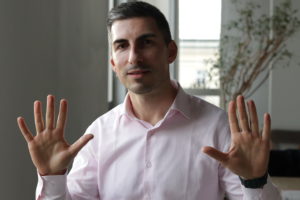
Over 100
What is the percentage of people working for the municipality, that you are sure understand the term data lake?
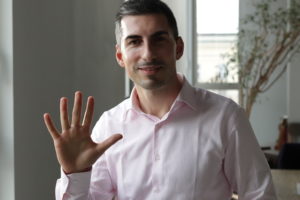
5% and the percentage increases exponentially every day (from 1500)
How many startup founders have you talked to in the past half a year?
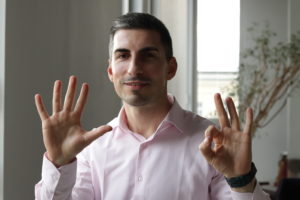
What percentage of your time do you spend talking to politicians?
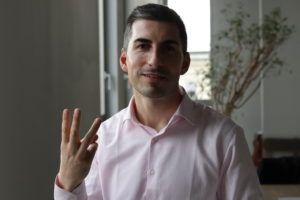
30%
How many days of the week do you wear a suit?
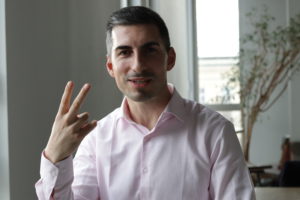
2
How many problems in Sofia that can be easily solved with technology come to your mind immediately?
